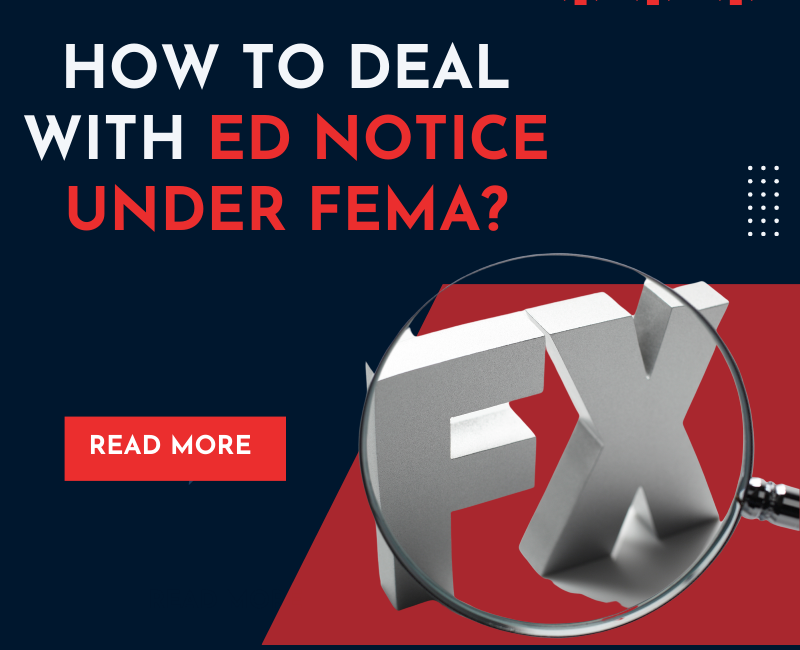The Foreign Exchange Management Act (FEMA) is an important regulation that governs foreign exchange transactions in India. It was introduced in 1999 with the objective of regulating the flow of foreign exchange in and out of India, as well as to facilitate external trade and payments. The Enforcement Directorate (ED) is the regulatory body responsible for enforcing the provisions of FEMA, and one of its important functions is issuing ED Notices.
An ED Notice is a formal communication from the Enforcement Directorate, indicating that they suspect the recipient of violating the provisions of FEMA. The notice can be issued to individuals or entities and can have serious legal consequences. ED Notices typically specify the nature of the alleged violation, the evidence supporting it, and the legal provisions that have been violated.
Receiving an ED notice under FEMA can be a stressful and daunting experience, but it is important to respond promptly and effectively. Seeking legal advice from a qualified lawyer or law firm with expertise in FEMA and related laws is the first step. It is also important to review the notice carefully, gather all relevant information and documentation, prepare a detailed response, and submit it within the specified time frame mentioned in the notice.
Cooperating with the Enforcement Directorate’s investigation and providing any additional information or documents that may be requested is crucial. Failure to cooperate can lead to further legal action and additional penalties. Following up with the Enforcement Directorate to ensure that the response has been received and is being considered is also important. By taking these steps, the recipient can minimize the legal consequences and protect their interests in response to an ED Notice under FEMA.
FEMA and its Objectives: FEMA was enacted by the Indian government in 1999 to replace the Foreign Exchange Regulation Act (FERA) of 1973. The primary objective of FEMA is to facilitate external trade and payments, promote the orderly development and maintenance of the foreign exchange market, and regulate the flow of foreign exchange in and out of India. FEMA also seeks to preserve the foreign exchange resources of India and prevent their misuse.
Enforcement Directorate (ED): The Enforcement Directorate (ED) is a law enforcement agency under the Department of Revenue, Ministry of Finance, Government of India. The ED is responsible for enforcing the provisions of FEMA, as well as the PMLA and Black Money Act and the Foreign Contribution Regulation Act (FCRA).
ED Notice: An ED Notice is a legal notice issued by the Enforcement Directorate to individuals or entities suspected of violating the provisions of FEMA. The notice informs the recipient of the alleged violation and requests them to provide information or documents related to the case.
Types of ED Notices:
There are two types of ED Notices that can be issued under FEMA:
Show Cause Notice (SCN): A Show Cause Notice is issued by the ED when there is sufficient evidence to suggest that an individual or entity has violated the provisions of FEMA. The notice requires the recipient to provide a written explanation as to why they should not face legal action for the alleged violation.
Provisional Attachment Order (PAO): A Provisional Attachment Order is issued by the ED when there is sufficient evidence to suggest that an individual or entity has committed a serious violation of FEMA. The order allows the ED to temporarily attach any property, assets, or funds of the recipient that are suspected to be involved in the violation.
The issuance of an ED notice does not necessarily mean that the recipient has been found guilty of violating FEMA. It is simply a legal process to investigate the alleged violation and determine whether or not legal action should be taken.
Receiving an ED Notice can have serious legal consequences. The notice is a formal communication from the Enforcement Directorate, indicating that they suspect the recipient of violating the provisions of FEMA. The consequences of receiving an ED Notice can include:
- Possible Penalties: If the Enforcement Directorate determines that the recipient has violated the provisions of FEMA, they can impose penalties that may include fines, imprisonment, or both. The penalty imposed will depend on the nature and severity of the violation.
- Legal Proceedings: Receiving an ED notice can lead to legal proceedings against the recipient. The Enforcement Directorate may initiate legal action to investigate the alleged violation and determine whether the recipient has actually violated the provisions of FEMA. The recipient may need to appear in court and may require legal representation to defend themselves against the allegations.
- Impact on Credit Score: If the recipient is found guilty of violating FEMA, it may have an adverse impact on their credit score. This can make it difficult for them to access loans or credit facilities in the future.
It is important to note that even if the Enforcement Directorate finds that the recipient has not violated the provisions of FEMA, the process of responding to the notice can be time-consuming, expensive, and stressful.
To minimize the legal consequences of receiving an ED Notice, the recipient should take immediate action to respond to the notice and seek legal advice. It is also important to comply with any directives given by the Enforcement Directorate and cooperate with their investigation. Failure to do so can lead to further legal action and additional penalties.
If an individual or entity receives an ED notice under FEMA, it is important to respond promptly and effectively. Here are the steps that can be taken to respond to an ED notice:
- Seek Legal Advice: The first step when receiving an ED notice is to seek legal advice from a qualified lawyer or law firm with expertise in FEMA and related laws. The lawyer can help the recipient understand the notice, assess the potential consequences, and provide guidance on how to respond.
- Review the Notice: It is important to carefully review the ED notice and understand the nature of the alleged violation. The notice will typically specify the nature of the alleged violation, the evidence supporting it, and the legal provisions that have been violated.
- Gather Relevant Information: The recipient should gather all relevant information and documentation related to the alleged violation. This may include financial records, bank statements, transaction details, and any other information that may be required to respond to the notice.
- Prepare a Response: The recipient should prepare a detailed response to the ED notice, addressing each point mentioned in the notice. The response should provide a clear explanation of the recipient’s position and any evidence supporting it. The response should be well-structured, concise, and factual.
- Submit the Response: The response to the ED notice should be submitted within the specified time frame mentioned in the notice. It is important to ensure that the response is submitted in the prescribed format and accompanied by all relevant documents.
- Cooperate with the Investigation: It is important to cooperate with the Enforcement Directorate’s investigation and provide any additional information or documents that may be requested. Failure to cooperate can lead to further legal action and additional penalties.
Follow up with the ED: The recipient should follow up with the Enforcement Directorate to ensure that their response has been received and is being considered. They should also seek updates on the status of the investigation and any further actions that may be required.
Conclusion:
Receiving an ED notice under FEMA can be a stressful and daunting experience. However, by taking prompt and effective action, the recipient can minimize the legal consequences and protect their interests. Seeking legal advice, reviewing the notice carefully, gathering relevant information, preparing a detailed response, cooperating with the investigation, and following up with the Enforcement Directorate are key steps in responding to an ED notice.
If you found this article on ED notices under FEMA informative, you may also want to check out our article on the RBI’s role under FEMA, which provides valuable insights into the Reserve Bank of India’s role in regulating foreign exchange transactions in India.



